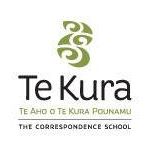Te Aho o Te Kura Pounamu (formerly The Correspondence School) is a regular school just like the one down the road. Its only difference is that its main purpose is to provide a free, fully-funded State education for those students who, for one reason or another, are unable to physically attend their local school. Enrolment at Te Kura can come under a number of categories:
- Eligible students who meet strict criteria (such as distance or psychological health issues) which prevents them attending local schools A student enrolled under this category is not being home educated and does not need an exemption from the Ministry of Education. To check eligibility, see the Te Kura website.
- Fee paying students who do not meet the criteria in (1) above and are aged under 16yrs – Students paying full fees can choose their own subjects and do not give up their exemptions, and their parents continue to receive the home education supervisory allowance. Due to the cost, home educated students usually wait until they are eligible for Young Adult enrolment. A fee schedule is on Te Kura website here.
- Students who are aged 16-19yrs – These students can be enrolled as Young Adults with no fees and this is often the path home educating families take. Young Adult students can choose their own subjects and levels (eg. they can take a subject at NCEA Level 3 without having to do Levels 1 and 2 first). Young adults enrolled in one or two subjects at a time at Te Kura are not fulltime students at a school, and therefore they do not give up their exemption status or their home education supervisory allowance. If they enrol in three or more subjects they automatically lose their exemption and subsequently the home education supervisory allowance. For more information click here.
- Students who are aged over 19yrs – Adult students pay a subsidised fee. Some may qualify for assistance from Work & Income NZ. For more information on adult student enrolment click here.
In 2011 NCHENZ put a submission forward to Te Kura requesting that a fee dispensation be given to home educated students who wish to commence studies in their 16th year but prior to their 16th birthday, as many students were disadvantaged in terms of their start time depending on when their 16th birthday fell. Te Kura agreed that students turning 16yrs in the first four months of the year (Jan-Apr) would pay one-third of the full fees; in the second four months of the year (May-Aug) they would pay two-thirds of the full fees; and in the last four months of the year (Sep-Dec) the student would be required to pay full fees. When the student turns 16yrs they can be enrolled as a Young Adult student at no cost (as per No 3 above). Applications for the enrolment of students turning 16 should be directed to the Enrolment Services Manager.
Home educated students who have an Exemption Certificate when they turn 16 are able to get their home education allowance up until the end of the year they turn 19, as long as they are still home educating (still completing their secondary education and not entered tertiary education or working fulltime).
Te Kura also offers an early childhood education service for children aged under 6yrs who live 6km+ from their nearest licensed early childhood education facility. The programme is based on Te Whariki, the NZ Early Childhood Curriculum Framework. For more information click here.
At a glance …
- Te Kura is a state-funded correspondence school
- Students can enrol under strict criteria
- Home educated students aged 16yrs+ can enrol for free in one or two subjects – enrolling in three or more subjects means the child loses their exemption
- Home educated students aged 15yrs pay a part-fee depending on where their 16th birthday falls in the year
- Home educated students under 16yrs need to pay full fees
- Te Kura also offer an ECE service for under 6yr olds

